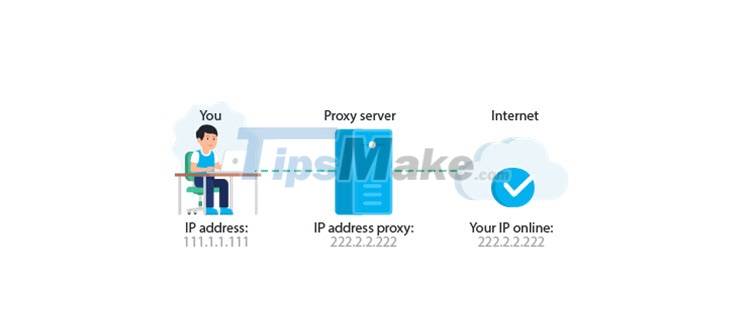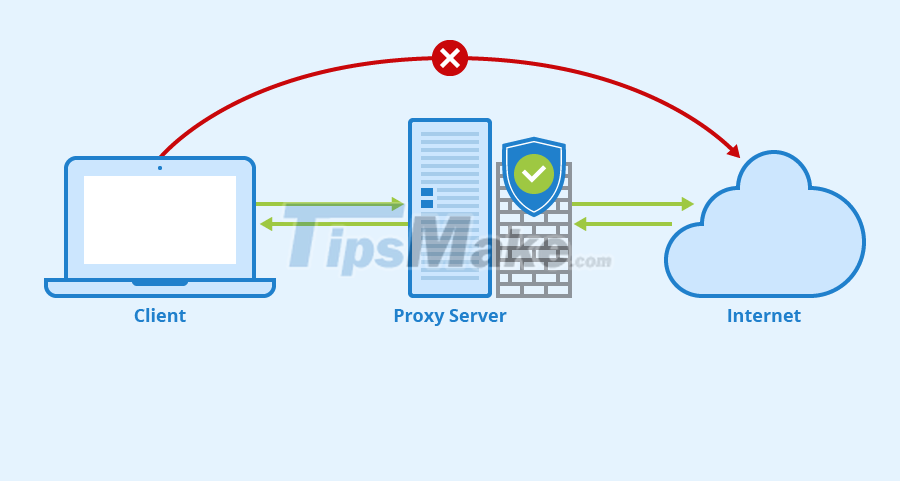Difference between VPN and Proxy
When we learn about network connections that help us hide information on the Internet, we will often confuse VPN and Proxy. Although they also have similarities, they are fundamentally different and they are used for different purposes. Let's learn about the difference between VPN and Proxy in this article.

1. What is a proxy?

Proxy, also known as Proxy server, refers to the intermediary data exchange between the device you are using to access the Internet and the Web site you are using. The way Proxy works is very simple, you will choose an intermediate Proxy Server and access the Web site, the intermediate Proxy server will take you to that website. Proxy Server will use algorithms to analyze the data of the Web page you want to open, then they will download its content to the Proxy Server to show you that Web page.
Because of having to download content to the Proxy Server, you will find that using the Proxy is relatively slower than accessing that Web site directly. Using a Proxy Server to mediate Web access helps you to impersonate the access location, access the Web site with a virtual location, hide the IP.
For example: You are in Vietnam and there are some Web sites that only support Internet addresses in the US. Thus, we will have to use a Proxy Server in the US to access them, the Proxy Server in the US will have the task of fooling that Web site into thinking that we are accessing the US Internet, not the Vietnamese Internet.
Many people choose to use a Proxy Server because they do not have to connect directly to the Web (intermediate through the Proxy Server). Not connecting directly to the Web site prevents them from exposing their IP address because the Web site accepts the Proxy Server's IP address as the access IP address.
Proxy's network access speed is usually determined by Proxy Server systems. If the Proxy provider places many Proxy Servers in your area, it will mean fast access speed and vice versa.

Although accessing by Proxy is very safe, today some Web sites have been updated with Proxy detection technology, so it is normal for your IP address to be exposed.
In short, Proxy is an intermediate network protocol, they are responsible for transmitting data to and from computers connected to the Internet and Websites.
2. What is a VPN?
In essence, VPNs also work like proxies because they are both an intermediary network connection between an Internet user and a Web site. The user's data will go through a server system, they will go from that server to the Web site and receive feedback data for you. However, the biggest difference between Proxy and VPN is that VPN encrypts user's data (when sending data) to increase security.

Using a VPN, you must use a software provided by the developer to encrypt your data when sending. This encrypted data makes Web pages unrecognizable and completely safe when accessing dangerous Web sites.
It is because of the 'twisting' in such a connection that makes VPN products quite expensive to use. But in return we will have a safe network connection, avoiding Hackers, revealing personal information.
3. Difference between VPN and Proxy
Thus, in essence, Proxy and VPN are similar when they do not bring the user's data to the Web site directly, but they will use an intermediary system to protect.
Proxy has a simpler protocol, less security when the data is not encrypted, and Web sites can detect the original IP address (yours) by algorithms and technology. Proxy will be suitable for basic users who want to create a virtual location to access exclusive Web content for the region, hide IP.

VPNs have a more complex network connection protocol as all data sent is encrypted before reaching intermediate systems. Because of encryption, Web sites will have to give up because they cannot exploit the data of the original visitor (ie you). However, we will have to pay a not cheap price to use this data security service. Most VPNs are often used by businesses and companies with large online transactions on the network for maximum protection.
In this article, Tipsmake has shown you the difference between Proxy and VPN. Wish you choose the right service for yourself!